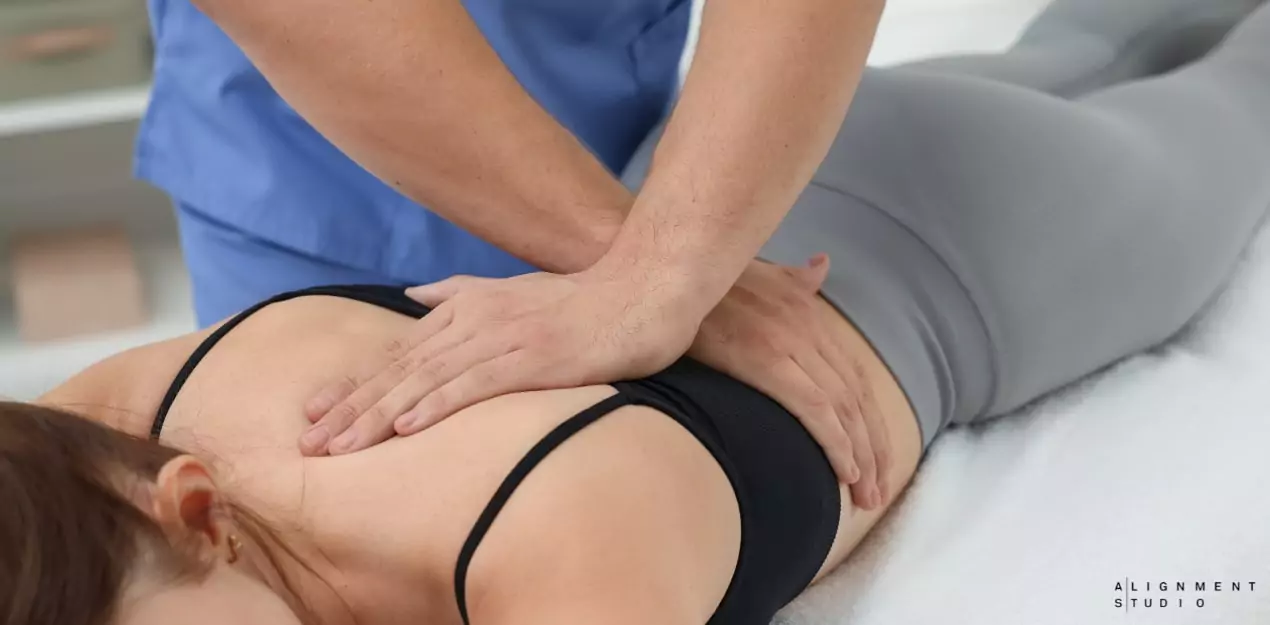The Link Between Neck Pain, Proprioception and Sensorimotor Control
Do you have neck pain accompanied by blurred vision, dizziness, headaches or difficulty reading? These are signs you may have sensorimotor control issues – and our physios can help!
A widespread and complex issue, neck pain affects millions globally. It is one of the most common complaints we see in the Studio, arising from a combination of physical, psychological, and behavioural factors that make diagnosis and treatment challenging.
Unlike straightforward injuries such as fractures, neck pain often lacks a clear cause. However, research has identified cervical proprioception – the ability to sense the position and movement of your head and neck relative to your body – as a key factor in understanding and addressing neck pain.
In this article, we explain how pain can alter your neck’s sensing abilities, and, in turn, balance and vision. And we explore the role physiotherapy plays in correcting neck dysfunction.
The Importance of Cervical Proprioception (Sensing Your Neck’s Position and Movement in Space)
Proprioception is a fundamental sensory mechanism (or capacity) that enables the body to maintain posture, balance, and coordination. It’s what allows you to stand, walk and move through life with confidence – sensing the position of your body parts even in total darkness.
When cervical proprioception, or the ability to sense your neck’s position and movements, is disrupted – potentially by neck pain – sensorimotor control disturbances can occur. Impacting the coordination between the head, eyes, and upper body, these disturbances can result in various symptoms, including dizziness, visual difficulties, and a sense of instability.
What Causes Sensorimotor Dysfunction?
Proprioception relies on proprioceptors – a type of mechanoreceptor located in multiple areas of the body.
In the cervical spine (neck region), these sensors are highly concentrated in the base of the neck (C1-C2) and play a pivotal role in keeping your balance and posture steady. As the neck integrates sensory inputs from the visual and vestibular (inner ear) systems, cervical proprioception is particularly crucial in keeping you upright and focused.
Unfortunately, injury (especially whiplash), inflammation and degeneration can impair these receptors, causing sensorimotor dysfunction.
How Does Neck Dysfunction Affect Balance and Vision?
When something goes wrong with how your neck senses movement, whether after an injury or long-term strain, problems such as dizziness and blurred vision can arise. Impairments in your neck’s sensing ability can cause three main issues:
- Proprioception problems – You might feel off-balance or like your head isn’t quite in the right place.
- Eye movement issues – Trouble coordinating your eyes and head can make it hard to read or stay focused.
- Postural instability – Feeling unsteady, especially when moving quickly or in dim lighting.
Even if there’s no inner ear problem, research shows these symptoms are very common in individuals with chronic neck pain.
Common Symptoms We See
People with these neck-related issues often come to us with the following symptoms:
- Feeling unsteady or off-balance.
- Trouble reading or focusing, especially when moving the head.
- Feeling dizzy or lightheaded (but not true spinning vertigo).
- Blurry vision or trouble seeing clearly for long periods.
These symptoms usually get worse with fatigue or long hours at a desk or computer – and they can really affect your daily life. But the good news is, there’s help available.
How Physiotherapy Can Help
Physiotherapy offers a structured and evidence-based approach to managing sensorimotor dysfunction. A leading physio for neck pain in Melbourne CBD, we offer targeted rehabilitation programs that focus on improving proprioception, eye movement control, and balance.
Proprioceptive Rehabilitation: Proprioceptive exercises aim to enhance the patient’s awareness of head and neck positioning. These exercises begin with simple, slow movements and progress gradually, retraining the proprioceptive system without overwhelming it.
Eye Movement Control Training: Exercises targeting eye-head coordination, such as gaze stabilisation and dynamic tracking tasks, are critical. These exercises help restore the synchrony between the visual and cervical systems, reducing symptoms like dizziness and eye strain.
Balance and Postural Training: Rebuilding stability involves structured balance exercises, starting in seated or supported positions and progressing to standing tasks on unstable surfaces. Over time, this training improves coordination and confidence in movement.
Effective physiotherapy for sensorimotor impairment involves a gradual approach to rehabilitation. Patients are advised to perform exercises 1–2 times daily, starting with 3–5 repetitions and increasing as their strength and control improve.
Our experienced physios take care to ensure exercises are performed within the patient’s comfort zone, with adjustments made to intensity and duration if symptoms such as dizziness or discomfort occur.
Breaking The Neck Pain Cycle
Neck pain (especially when chronic or from injury) can disrupt proprioception, leading to sensorimotor problems. These impairments – like dizziness, poor balance, and visual disturbances – can, in turn, contribute to more neck pain. And so, on it goes…
Thankfully, physiotherapy provides a comprehensive approach to treatment, focusing on restoring proprioception, improving eye-head coordination, and enhancing postural stability.
By adopting a tailored rehabilitation program, patients can experience significant reductions in symptoms, improved quality of life, and renewed confidence in their movements. Physiotherapists play a crucial role in guiding individuals through this process, offering evidence-based interventions that target the root causes of sensorimotor dysfunction.
This approach underscores the potential for physiotherapy to not only alleviate neck pain but also restore functionality and well-being in affected individuals.





